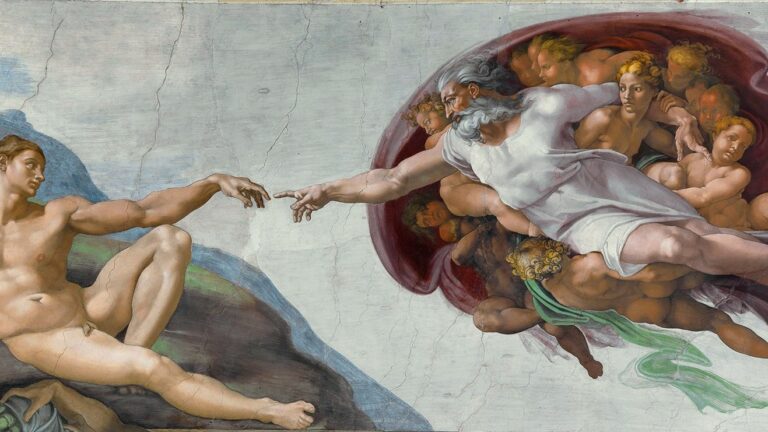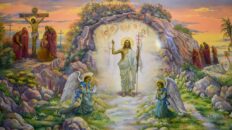THEME: TO GOD BE THE GLORY
READINGS: 2 Samuel 7:1-6, 8-12/ Romans 16: 25-27/ Luke 1:26-38
Fourth Sunday of Advent
On the night of the birth of our Saviour Jesus Christ, the choir of angels sang to the amazement of the blessed shepherds of Bethlehem: “Glory to God in the highest, and on earth peace, goodwill toward men” (Luke 2:14). It should be clear from the song of the angels that fundamental to the mission of the Saviour is to bring glory to God and the peace of salvation to all mankind. In this homily, we will focus on giving God the glory, as it is a message that runs through the three readings.
A STORY OF TWO TAXI DRIVERS
Two drivers, Kofi and Kwesi, were engaged by a businessman to drive two of his taxis on a “work and pay” basis. That is, each driver was to run a taxi and make total sales of GHȼ 120, 000.00 (about $20,000.00) over a period, after which the driver will own the taxi. Both drivers managed to make the required total sales after six (6) years and owned their respective taxis. Though the taxis were then in bad shape, the drivers were appreciative of the blessing of becoming car owners, so they each wrote “TO GOD BE THE GLORY” behind their cars.
Both drivers worked harder and after a few years, each of them purchased a 23-seater bus. On the one hand, the first driver, Kofi, decided to share the glory of his achievement with God, so he inscribed behind his bus the words: “GOD HELPS THOSE WHO HELP THEMSELVES”. On the other hand, notwithstanding his hard work, the second driver, Kwesi, decided to ascribe all the glory to God; so, he inscribed behind his bus the words: “ORIGINAL, TO GOD BE THE GLORY”.
Kofi and Kwesi kept working hard and eventually, each of them was able to purchase a 60-seater bus. Kofi was by then full of himself and so he ignored the providence of God, as evident on the inscription on his big bus: “BY DINT OF HARD WORK”. On the other hand, Kwesi still remembered the source of his blessings, and so he wrote on his bus: “STILL, TO GOD BE THE GLORY”.
Beloved, which of the two drivers would you emulate? I urge that we emulate the Kwesi, the second driver, by always giving God the glory.
THE READINGS
To give God the glory is a message which runs through today’s readings. For instance, in the second reading, St. Paul gives glory to God through Jesus Christ: “To Him [God] who is able to strengthen you … – to the only wise God be glory for evermore through Jesus Christ! Amen” (Rom. 16:25-27).
Similarly, in the first reading (2 Sam. 7), King David, in appreciation of God’s blessings, decided to build a temple to the glory of God. Happily, while the king was planning to glorify God, He had a better plan of an awesome blessing for the king. That is, to bless the king with an everlasting throne by making the Son of God the son of David as well.
Likewise, the Blessed Virgin Mary had decided to lead a life of dedication to the glory of God. Happily, according to the gospel reading (Luke 1:26-38), God surprised her with an out-of-this-world blessing. That is, she became the very mother of the Saviour, the Mother of the Son of God, the Queen of Heaven – an everlasting Queen-ship!
HOW TO GLORIFY GOD: LESSONS FROM DAVID AND MARY
There are many ways by which we can glorify God. Let us, however, limit ourselves to the following four points from the lives of King David and Mother Mary:
Acknowledge one’s humble beginnings: To give God the glory, we must, like David and Mary, acknowledge our humble beginnings. David was conscious of the fact that he was a mere shepherd of the flock of his father, before God elevated him to the throne. Mary, likewise, humbly acknowledged before the angel Gabriel that she was the handmaid or maidservant of the Lord.
Avail ourselves for God’s use: When the angel announced to Mary how God wanted to engage her to save mankind, she responded: “Let it be done to me according to your word” (Luke 1:38). Thus, she availed herself like an instrument in God’s hand. In a similar way, we can also glorify God.
Use our resources to the honour of God: King David decided to use the riches of his kingdom to build a temple to honour God. Though God does not really need our material resources (as is clear in David’s story), we give him the glory, when we make use of our resources to foster worship of him, to aid the spread of the good news, or to promote other ventures to his honour.
Believe God can do more than we expect: David, for instance, believed that the Lord who empowered him as a shepherd to kill lions and bears could empower him to defeat the fearsome Goliath (1 Sam. 17:34-37). Mary, in turn, in accepting the assurance of angel Gabriel that “with God nothing is impossible” (Luke 1:37), believed that she would conceive without knowing a man, and what is more, she would give birth to the Son of God! Likewise, we give God the glory when our faith-attitude is that being God, he can do more than we ask for or can imagine, for nothing is impossible with him!
CONCLUSION
Beloved, let us now conclude with the prayer of St. Paul in Ephesians 3:20-21: “Now to Him [God] who is able to do exceedingly abundantly above all that we ask or think, according to the power that works in us, to Him be glory in the Church by Christ Jesus to all generations, forever and ever. Amen.”
By Very Rev. Fr. John Louis








